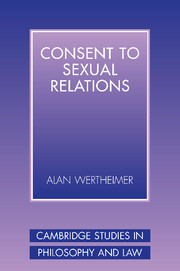Book contents
- Frontmatter
- Contents
- Preface
- Acknowledgments
- Abbreviations
- 1 Introduction
- 2 Law
- 3 The psychology of sex
- 4 The psychology of perpetrators
- 5 The harm and wrong of rape
- 6 The value of consent
- 7 The ontology of consent
- 8 Coercion
- 9 Deception
- 10 Competence
- 11 Intoxication
- 12 Sex and justice
- Appendix: Alphabetical list of hypothetical cases
- Index
8 - Coercion
Published online by Cambridge University Press: 04 March 2010
- Frontmatter
- Contents
- Preface
- Acknowledgments
- Abbreviations
- 1 Introduction
- 2 Law
- 3 The psychology of sex
- 4 The psychology of perpetrators
- 5 The harm and wrong of rape
- 6 The value of consent
- 7 The ontology of consent
- 8 Coercion
- 9 Deception
- 10 Competence
- 11 Intoxication
- 12 Sex and justice
- Appendix: Alphabetical list of hypothetical cases
- Index
Summary
The task of the principles of valid consent (PVC) is to provide the criteria by which to determine when B's token of consent to sexual relations is valid or morally transformative. We might put the issue in negative terms, in which case the question is whether B's consent is invalid in one respect or another. In this and the following three chapters, I want to consider three sorts of potential defects in consent – coercion, information (or deception), and competence, devoting one chapter to issues of intoxication.
To speak of a “defect” in B's consent is to assume that B does manifest a relatively unambiguous token of consent to sexual relations with A. And so I shall assume. I therefore set aside those cases in which B does not token consent at all, as in cases of pure force and unconsciousness. In a case of pure force, A penetrates B without any willed acquiescence or cooperation on B's part.
Pure Force. A and his accomplices tie B's arms and legs to a bed. A penetrates B while B screams, “No, please stop.”
I suspect that rape by pure force is relatively rare. The use of force is typically accompanied by coercive threats of additional force if B does not acquiesce.
Force. A overpowers B physically, holds her down despite B's attempts to resist and threatens her with additional force if she continues to resist.
- Type
- Chapter
- Information
- Consent to Sexual Relations , pp. 163 - 192Publisher: Cambridge University PressPrint publication year: 2003



